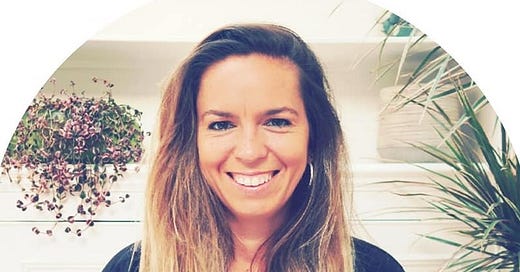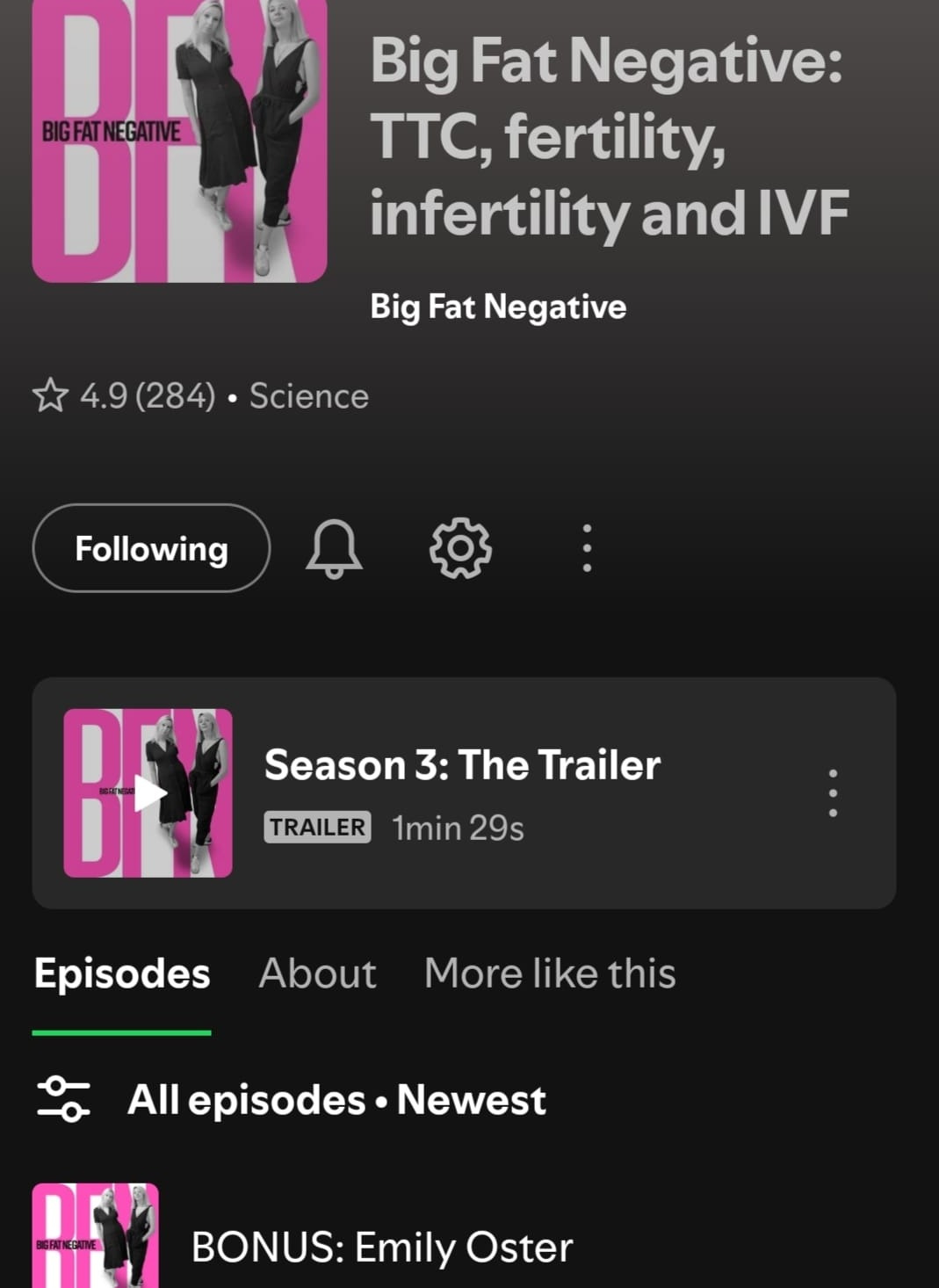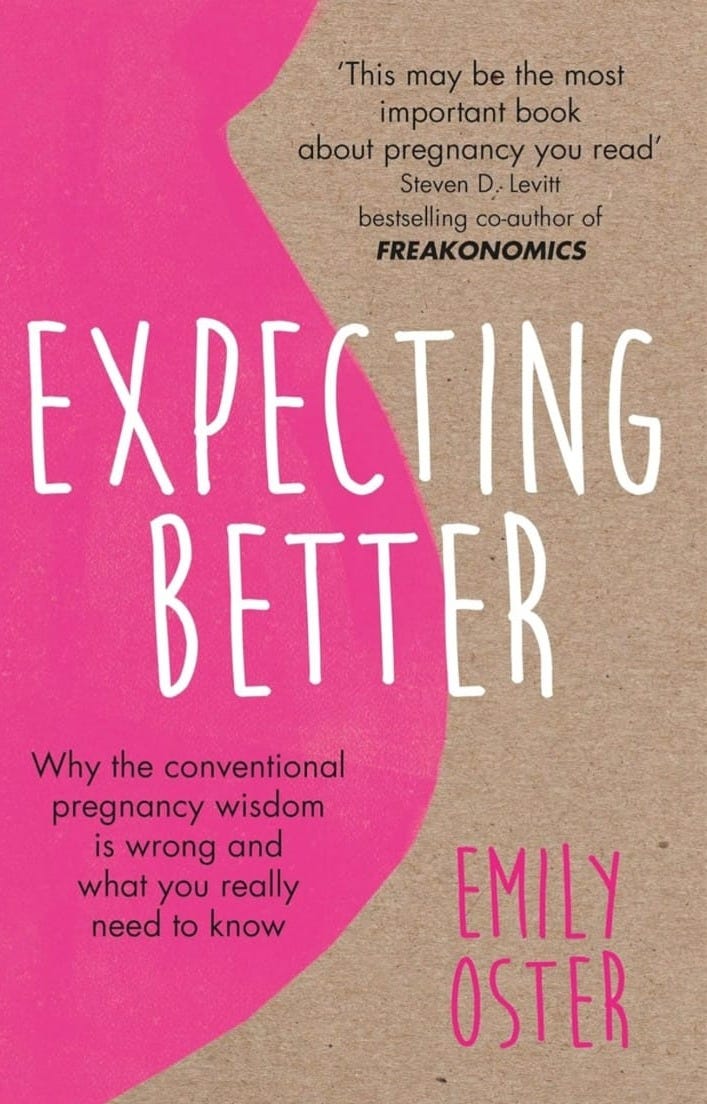Busting Fertility Myths With Data: 3 Things I Loved About This Podcast With An Economist (& Why)
Taking comfort in data - and debunking common myths
Instagram: @solofertility40s
At 43 years old, am I really passed it?
Inside, I feel about 25.
My low AMH tells a different story. If you’re above 40, you’re likely painfully aware of the (in)fertility myths concerning age. One of the most referenced might be that a woman’s fertility nose dives at 35, and then falls of a cliff at 40.
But what does the data say?
Enter Emily Oster.
Listening to Emily on the Big Fat Negative podcast was so refreshing!
(It was another cracking episode from the fantastic BFN ladies, who were understandably fan-girling all over this one!)
Emily explains that, as an economist, she finds comfort in the data.
And so do I.
I’ve spent eight months on the fertility socials wading through fear marketing, and the suspicious egg quality improvement claims. It’s been so intense - I feel like shouting “pass me the vodka”.
Perhaps a better option would be “show me the data”.
Oster’s data-led insights bring clarity to the confusion.
Here’s my top 3 podcast takeaways.
18:37 minutes:
I loved Emily’s response to this question: “Is there such a thing as knowing too much?”
‘Shared decision making’ is referenced often by doctors. When this happens effectively, it looks like:
For patients: knowing enough to be an expert in your preferences and what matters to you; plus enough about the medical environment to have an informed conversation.
For doctors: being informed enough about the patients’ preferences to engage with them, while being the expert as the doctor.
Why it matters: A positive outcome is hugely influenced by the dynamic between you and your doctor. It’s a fine balance. If either oversteps the mark, balance is lost, leading to frustration and disappointment.
I’ve already had to move doctors twice and am searching again for my third IVF cycle (using own eggs). Perhaps my path would have been less fraught if I’d better understood the doctor-patient dynamic at the beginning.
23 minutes:
Gold standard studies have two important features:
Randomised - splits study participants at random into groups and monitor how the test impacts them;
Large studies - preferable regardless of whether the study is randomised.
Why it matters: Advocating for yourself when undergoing fertility treatment may include reading studies on sites like PubMed. Large randomised controlled trials are preferable for studying causal relationships as randomisation eliminates much of the bias inherent with other study designs.
31 minutes:
Common belief: 35 is the fertility cliff-edge. This is drawn from Victorian data sets. Anything repeated often enough becomes widely accepted.
In reality, fertility is declining from the age of 20. There is no sharp decline at any particular age. It is possible to get pregnant after the age of 35 and even after 40 - but it is harder.
Why it matters: The facts allow us to make more informed decisions. Myths cause misconceptions. Although low AMH means that you have a low ovarian reserve, it doesn't mean that you will not be able to conceive naturally, or via assisted fertility technologies, such as IVF.
Some doctors are more specialised and experienced than others in treating women above 40 with low AMH. So find one who is supportive of your situation, your body and your choice - whatever that may be.
Final Thoughts
Frustration and overwhelm on this path are huge.
And fertility myths don’t help.
These myths are often based on old data, rather than facts. But as Emily Oster highlights, knowledge is power. Understanding the real numbers behind fertility—rather than fear-based narratives—allows us to make informed, confident decisions about our own paths.
And when you’re solo and likely funding this journey alone -
Tip: If you’re really uncertain about your treatment, an independent fertility expert could help. They will review your test results and provide impartial advice.
For example - embryologist Victoria Wigley founded All About Embryology to provide clear patient advice and support.
(I don’t earn commission for recommendations.)
Want a bit more Emily in your life?
Her book is currently £2.99 on Amazon. I’m at Chapter 2 and thoroughly enjoying it.
Expecting Better: Why the Conventional Pregnancy Wisdom is Wrong and What You Really Need to Know
FREE: Resources page on Solo Fertility 40s with my favourite webinars, articles, forums and podcasts. I’m adding to this all the time so keep checking back.
FREE: 10 Important Questions for Your Fertility Consultation
Sarah x
SEND A SMOOTHIE: Each story takes me around 4 hours to write, edit, test and send. I do this alongside my day job. I’m powered by daily berry smoothies! If you find my stories useful, you are welcome to show your appreciation by gifting one.





